(VOVWORLD) - Foreign Minister Bui Thanh Son has affirmed that the Party and State of Vietnam value the friendship and cooperation relations with China and want their relationship to develop in a healthy, sustainable and long-term manner with increasing political trust and more effective and substantive cooperation.
 Vietnamese Foreign Minister Bui Thanh Son (L) and Chinese Foreign Minister Wang Yi (R) (Photo: VNA) Vietnamese Foreign Minister Bui Thanh Son (L) and Chinese Foreign Minister Wang Yi (R) (Photo: VNA) |
Foreign Minister Bui Thanh Son met Chinese Foreign Minister Wang Yi in Myanmar on Monday on the sidelines of the seventh Mekong-Lancang Cooperation Foreign Ministers’ Meeting.
Mr. Son also suggested that the two sides maintain close coordination in COVID-19 prevention and control, soon resume commercial flights between the two countries, and speed up the connection of road and rail transport infrastructure in the border to facilitate people’s travel.
Chinese Foreign Minister Wang affirmed that the Chinese Party and Government value consolidating and developing the China-Vietnam comprehensive strategic cooperative partnership. China is willing to coordinate and promote high-level exchanges and contact with Vietnam in the coming time through many flexible forms, he said.
He reiterated China’s consistent policy of opening the market to import high-quality goods from countries in the region, especially from ASEAN countries, including Vietnam. He appreciated the role Vietnam plays in the global supply chain, and said China desires to coordinate with Vietnam in economic, trade and investment cooperation to ensure the stability of the global supply chain.
With regard to the East Sea issue, Minister Son said the two sides should continue to well implement agreements and high-level common perceptions, and respect each other’s legitimate interests in accordance with international law including the 1982 United Nations Convention on the Law of the Sea (UNCLOS).
He also proposed the two sides fully and effectively implement the Declaration on the Conduct of Parties in the East Sea (DOC) and strive to soon achieve a substantive, effective Code of Conduct in the waters in accordance with international law, so as to jointly maintain peace, stability and freedom of navigation in the East Sea.